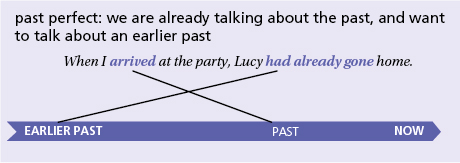Past perfect: basic information
This entry deals with the simple past perfect. For the past perfect progressive, (see here).
Forms
had + past participle
- I had forgotten.
- Where had she been?
- It hadn’t rained for weeks.
For passives (e.g. The work had been done), (see here).
Meaning and use: earlier past
The basic meaning of the past perfect is ‘earlier past’. A common use is to ‘go back’ for a moment when we are already talking about the past, to make it clear that something had already happened at the time we are talking about.
- During our conversation, I realised that we had met before. (not
I realised that we met beforeor… have met before.) - When I arrived at the party, Lucy had already gone home. (not
… Lucy already went home.or… has already gone home.)
The past perfect is common after past verbs of saying and thinking, to talk about things that had happened before the saying or thinking took place.
- I told her that I had finished. (not
… that I (have) finished.) - I wondered who had left the door open.
- I thought I had sent the money a week before.

Past perfect not used
The past perfect is normally only used as described above. The past perfect is not used simply to say that something happened some time ago, or to give a past reason for a present situation.
- Alex Cary, who worked for my father in the 1980s, is now living in Greece. (not
Alex Cary, who had worked for my father …) - I left a jacket to be cleaned. Is it ready yet? (not
I had left a jacket …)
Unreal events: if, etc
After if (see here), wish (see here) and would rather (see here), the past perfect can be used to talk about past events that did not happen.
- If I had gone to university I would have studied medicine.
- I wish you had told me the truth.
- I’d rather she had asked me before borrowing the car.
how long? past perfect, not simple past
We use a past perfect, not a simple past, to say how long something had continued up to a past moment. A simple past perfect is used with non-progressive verbs like be, have and know.
- She told me that her father had been ill since Christmas. (not
… that her father was ill since Christmas.) - I was sorry to sell my car. I had had it since College. (not
… I had it since College.) - When they got married, they had known each other for 15 years. (not
… they knew each other for 15 years.)
With most other verbs, we use the past perfect progressive for this meaning (see here).
For the difference between since and for, (see here).